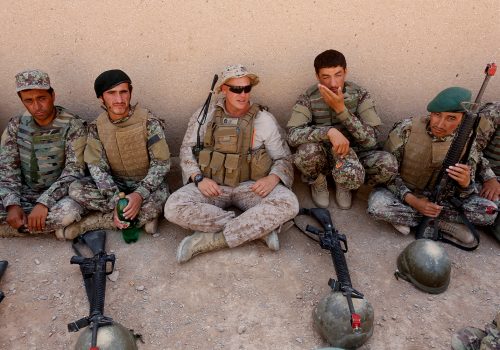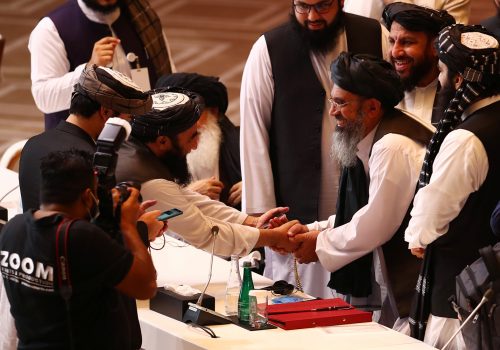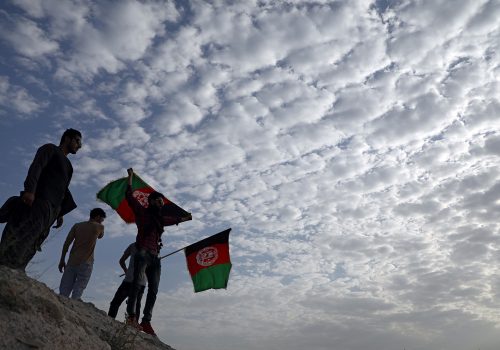FAST THINKING: Leaving Afghanistan, twenty years later
JUST IN
Twenty years. America’s longest war is set to finally come to an end, with President Joe Biden expected to announce on Wednesday that all American troops will withdraw from Afghanistan by September 11, 2021, the twentieth anniversary of the al-Qaeda attacks. After the deaths of more than 2,400 American service members and at least 100,000 Afghans, what’s the state of the nation that the US military will leave behind? Will we see a repeat of the brutal Taliban rule of the 1990s? And after so many withdrawal timelines issued by so many US administrations, will this one even hold? Our experts weigh in.
TODAY’S EXPERT REACTION COURTESY OF
- William Wechsler (@WillWechsler): Director of the Rafik Hariri Center and Middle East Programs
- Barry Pavel (@BarryPavel): Director of the Scowcroft Center for Strategy and Security
- Irfan Nooruddin: Director of the South Asia Center
America’s new normal in Afghanistan
- As Will sees it, “the core US national-security interest in Afghanistan is that its territory is never again used as a launching pad for a terrorist attack on Americans, at home or abroad.”
- And despite the countless setbacks that the United States has experienced since the October 2001 invasion, he points to progress on this front: “The Salafi jihadist threat in the area is far weaker than it was two decades ago.” Now the US goal from a counterterrorism perspective should be to operate in Afghanistan as it would in any other nation facing similar threats, Will tells us.
- What does that look like? “Maintaining a very modest number of special operators to continue their work, as we do outside of war zones in many other countries,” he says. To that end, the Biden administration “should avoid policies that impose blanket prohibitions against such indirect operations.”
Biden’s new geopolitical calculus
- As vice president, Biden argued against then-President Barack Obama’s 2009 troop surge in Afghanistan. And Barry believes the decision now to withdraw the remaining US forces in the country reflects Biden’s long-standing views in favor of “more of a standoff” US military posture “focused on counterterrorism priorities.”
- But a lot has also changed over the decade or so in which Biden has developed these views, Barry adds. Beijing may be more on the mind of the US president than Kabul is. That doesn’t mean flooding the Indo-Pacific with US ground forces, he notes, but “the Biden team clearly has its sights set both on reducing lower-priority operations and shifting a wide variety of resources increasingly over time to strengthen deterrence in the region” and contend with the “geopolitical and security challenges posed by China.”
Afghanistan’s new reality
- Irfan is alarmed about where this decision leaves the country that US forces will be leaving behind. “The announcement that the Trump administration’s arbitrary deadline of complete US troop withdrawal from Afghanistan by May 1 has been changed to an equally arbitrary—if seemingly more symbolic—deadline of September 11 by President Biden is as disappointing and discouraging as it was when President Trump made his announcement,” he says
- The announcement “also makes clear the extent to which Trump reshaped the contours of American foreign policy,” he argues. “Postponing the withdrawal date allows the Biden team to act as if it is forging its own path, though ultimately the script was authored by its predecessors. The government in Kabul is undermined, the Taliban and its allies are empowered, and the die is cast for another long, bloody summer.”
- “Women and religious minorities have made difficult but significant gains over the past decade” in Afghanistan, Irfan notes, which “is to the credit of incredibly brave Afghan civil-society and political leaders who have withstood umpteen assassination efforts. Today’s announcement leaves them to fend for themselves against opponents who respect no boundaries in their use of indiscriminate violence to achieve their ends.”
- That grim reality should serve as a rebuke to “the language of ‘endless war’ now commonplace in American discourse,” Irfan says. “The only endless war is the one the Afghan people have endured for over four decades. They deserve better than what successive US administrations have been able to deliver.”
Further reading
Tue, Nov 17, 2020
FAST THINKING: Trump’s plan to bring US troops home by Inauguration Day
Fast Thinking By
First he shook up the leadership at the Pentagon. Now, as his new acting defense secretary announced on Tuesday, Donald Trump is planning to withdraw significant numbers of US troops from Afghanistan and Iraq. How should we weigh the noble cause of ending wars against the president’s rush to do so as his term comes to an end? And how will these moves affect the Biden administration’s options when it takes office in January?
Wed, Dec 16, 2020
To succeed, intra-Afghan talks must defer to the non-ideal
New Atlanticist By
The negotiations between the Afghan government and the Taliban should just as much center on the question of whether we should ground political morality in a vision of a distinct Islamic polity (that of the Taliban or the Afghan government), or a non-ideal mode of Islamic governance reflecting the second-order and third-order preferences of the parties.
Wed, Jan 13, 2021
The way forward in Afghanistan: How Biden can achieve sustainable peace and US security
New Atlanticist By
Afghanistan may actually now have a chance to achieve some form of political settlement and significantly reduced violence.
Image: U.S. troops patrol at an Afghan National Army (ANA) base in Logar province, Afghanistan August 7, 2018. REUTERS/Omar Sobhani


